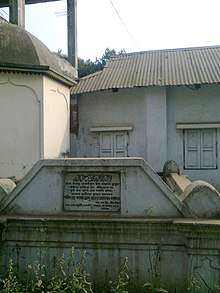Abu Taher Mohammad Haider
Abu Taher Mohammad Haider, Bir Uttom (12 January 1942 – 7 November 1975[1]) was a Bangladesh Army officer and recipient of Bir Uttom, the second highest military award in Bangladesh. He fought in the Bangladesh Liberation War as the second-in-command of the K force under Khaled Mosharraf. After the assassination of the President of Bangladesh, Sheikh Mujib in a military coup; he joined a counter coup led by his former commander Khaled Mosharraf. He was killed in the coup along with Mosharraf on 7 November 1975 by Colonel Abu Taher.[2]
A. T. M. Haider | |
|---|---|
| Born | 12 January 1942 Bhowanipore, Kolkata, West Bengal |
| Died | 7 November 1975 |
| Allegiance | |
| Service/ | Pakistan Army Bangladesh Army |
| Years of service | 1965-1976 |
| Rank | Lieutenant Colonel |
| Unit | 23rd Peshawar Mountain Battery (Frontier Force) |
| Awards | Bir Uttom |

Early life
ATM Haider was born in Bhowanipore, Kolkata, West Bengal, on 12 January 1942 . His father Mohammad Israil was a Sub Inspector in the Kolkata Police after which he worked as a lawyer; his mother was Hakimun Nesa. He studied in Binapani Primary School, Pabna. He graduated from Ramananda Government High School and Gov't Gurudayal College, Kishoreganj. He did his undergraduate in Lahore Islamia College and completed his graduate studies in 1964 from the Punjab University.[2]
Career
After finishing his graduate studies he joined the Pakistan army as a commissioned officer. He graduated from Pakistan Military Academy and commissioned as an Artillery officer in the 23rd Peshawar Mountain Battery (Frontier Force) in 1965. He was posted at Pano Aqil and at Multan Cantonment where he stayed until 1969. On 9 September 1970, he was promoted to Captain. He was transferred to Comilla Cantonment.[2]
Two days after the start of Operation Searchlight began, on 27 March 1971 he left Comilla Cantonment. In Brahmanbaria he met with officers from the fourth East Bengal Regiment. He went through Teliapara tea garden to India. He returned from India with few Mukti Bahini members. He sabotaged the Mymensingh-Kishoreganj highway and the Musalli Bridge. On 7 October 1971, he joined K force under Khaled Mosharraf as his second-in-command. His unit was mostly composed of students whom he trained in guerrilla warfare. Most of the guerrilla attacks in this sector were carried under his command.[2][3]
He was present during the surrender of Pakistan Army on 16 December 1971. After the Independence of Bangladesh, he was promoted to Major and made the commanding officer of 13 East Bengal Regiment. He was promoted to Lieutenant Colonel and was transferred to Chittagong Cantonment to head the then-nascent School of Artillery. On 21 October 1975 he was transferred to Ruma Cantonment.[2]
Death
After the Assassination of Sheikh Mujibur Rahman there was confusion in the army. He was in Dhaka due to personal reasons on 3 November when Khaled Mosharraf launched a coup to remove the assassins of Sheikh Mujib from power. He was assassinated with his former commander Mosharraf on 7 November 1975 in Dhaka Cantonment in the subsequent coup by Colonel Abu Taher. He was buried in his hometown in Kishoreganj.[2][4]
References
- Ekatorer Birjoddha, (2nd Part). Prothoma Prokashon. March 2013. p. 52. ISBN 9789849025375.
- Ahmed, Lilyma. "Haider, Lt Colonel ATM". en.banglapedia.org. Banglapedia. Retrieved 10 November 2016.
- "Commemorating Teliapara with a 'Muktijuddha Smriti' Complex". The Daily Star. 5 December 2014. Retrieved 10 November 2016.
- "November 7: Let the truth be known". The Daily Star. 7 November 2013. Retrieved 10 November 2016.